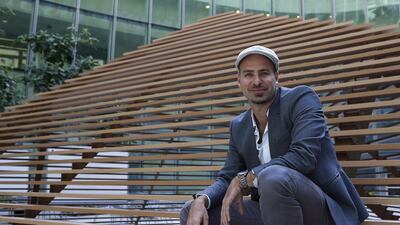There are probably many of us who felt our blood pressure rise when we witnessed someone tossing litter into the street.
With such lack of respect for our surroundings, it can be tempting to step in and reprimand the person responsible.
Dropping a paper cup is a casual disregard for our environment but it is small scale.
Discarding an entire bag of rubbish is far worse and in such circumstances we would, surely, be more likely to intervene and ask the offender to pick up their rubbish.
Or would we?
A recent study co-authored by Nikos Nikiforakis, a professor of economics at NYU Abu Dhabi, sheds light on this question.
In the study, published in the journal Nature Communications, Prof Nikiforakis and his co-authors, Prof Loukas Balafoutas, of the University of Innsbruck in Austria, and Prof Bettina Rockenbach, of the University of Cologne in Germany, set up the scenarios described above.
At a railway station, they got a woman to throw an empty coffee cup or a large paper bag containing rubbish, including a coffee cup, on the ground.
Each of these “norm violations” was carried out about 100 times, with an observer recording the reaction of a bystander.
In another set of scenarios, the person not only let go of the coffee cup or the bag of rubbish but also, 10 to 15 seconds later, “accidentally” dropped some books on the ground, apparently without realising it.
Again, each scenario was repeated about 100 times. In a further variation, the woman simply dropped her books without having discarded rubbish.
The study took place at two stations in Cologne.
The results showed that people were no more likely to intervene to scold the offender when she had dropped a bag of rubbish than when she had dropped just a coffee cup.
In both cases, the rate at which the bystander intervened and asked the woman to pick up her rubbish was between 14 per cent and 15 per cent. The intensity of the reprimand was roughly the same regardless of whether the offence was small or large – despite respondents of a survey saying they were more annoyed by a large offence and that large offenders deserved a stronger reprimand.
Then the researchers looked at how willing people were to assist when someone dropped the books.
They found that bystanders were equally disinclined to help the book dropper if they had dropped either a coffee cup or the bag of rubbish but were more inclined to help the book dropper who had not littered.
The findings are contrary to earlier laboratory studies, which indicated that the strength of punishment increased with the severity of the offence to accepted or expected behaviours.
Moreover, the idea that altruistic punishment becomes more severe as the norm offence becomes greater is key to many explanations as to why cooperation evolved in human society.
“The big question is, why do people cooperate with strangers?” says Prof Nikiforakis, a Greek who has worked in Australia, Germany and France.
“Nowadays we’re living in big societies. A lot of our interactions are with strangers.
“Why don’t we litter? Why don’t we jump the queue?
“The fear of altruistic punishment is the most prominent explanation as to how this behaviour evolved but it relies on a critical condition: that punishment increases with the severity of the offence.
“It’s the same principle we have in the courts, in common and criminal law.
“In several lab experiments this condition is satisfied. In lab experiments, one of the problems is that if you omit certain forces important in life, your results may not generalise.”
The researchers think that people are not more inclined to intervene when the offence is larger because they fear retribution, which may be perceived as being more likely when the offence is more serious.
“In real life, if someone says: ‘Why are you doing this?’ you may fight back,” says Prof Nikiforakis.
“This was key in the result: the worse the violation, the more afraid the bystander is that the violator will turn against them.
“I had some evidence in a previous study that suggested this may be happening: people may be more afraid of the worst violators. But it’s a surprising result nevertheless.”
It helps to explain, says Prof Nikiforakis, why institutions in charge of enforcing cooperation, such as the police, have emerged as human societies have developed.
In this view, behaviour that is widely accepted as being what people should do needs to be overseen by some sort of control mechanism and protected by law.
Prof Nikiforakis emphasises that explaining the existence of cooperation among strangers is a separate issue to explaining it among close relatives or other people who live together in close communities.
In these cases, explanations are based on genetics or the fact that individuals interact repeatedly with one another, something that does not apply to strangers.
Prof Nikiforakis does not feel there is, as yet, a convincing alternative explanation to the altruistic punishment theory to explain the widespread cooperation among strangers.
This area of research therefore has important questions still looking for answers.
“There’s a lot of work to be done for sure, there’s lots to learn about why people cooperate with others, especially anonymous strangers,” says Prof Nikiforakis.
newsdesk@thenational.ae


